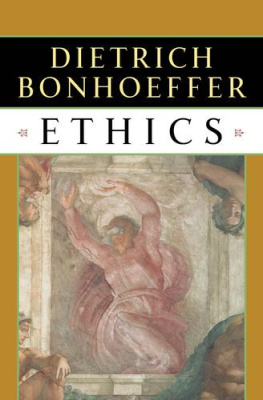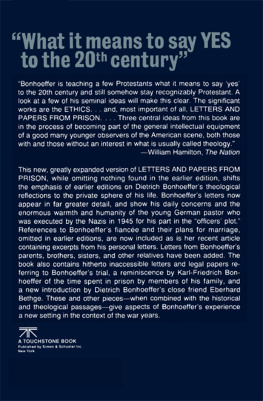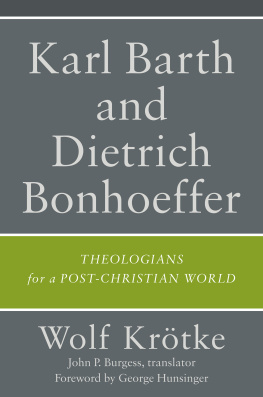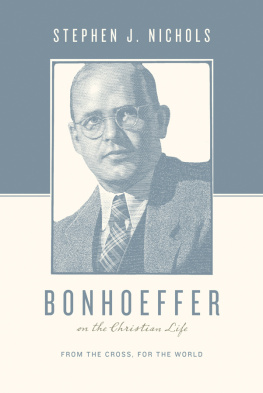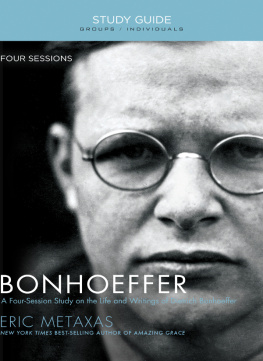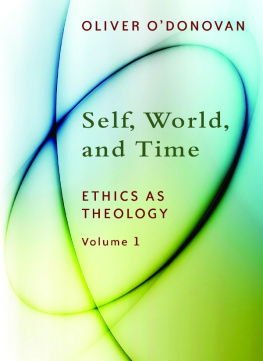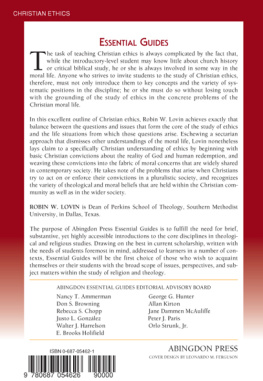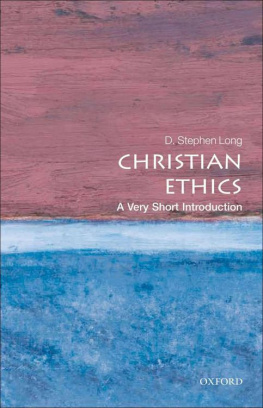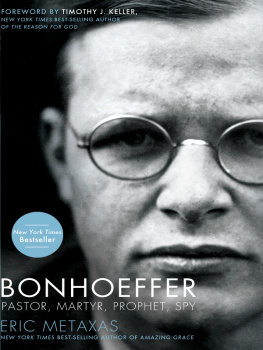DIETRICH BONHOEFFER was born in Breslau in 1906. The son of a famous German psychiatrist, he studied in Berlin and New York City. He left the safety of America to return to Germany and continue his public repudiation of the Nazis, which led to his arrest in 1943. Linked to the group of conspirators whose attempted assassination of Hitler failed, he was hanged in April 1945.
Register online at www.simonandschuster.com for more information on this and other great books.
A LSO AVAILABLE FROM S IMON & S CHUSTER
The Cost of Discipleship
Creation and Fall/Temptation
Letters and Papers from Prison
The Martyred Christian


TOUCHSTONE
An Imprint of Simon & Schuster, Inc.
1230 Avenue of the Americas
New York, NY 10020
Translated by Neville Horton Smith from the German Ethik, Chr. Kaiser Verlag, Munich, 1949
Copyright 1955 by Macmillan Publishing Company,
a division of Macmillan, Inc.
English language translation copyright 1955 by S.C.M. Press Ltd.
All rights reserved, including the right to reproduce this book or portions thereof in any form whatsoever. For information, address Touchstone Subsidiary Rights Department, 1230 Avenue of the Americas, New York, NY 10020.
First Touchstone Edition 1995
T OUCHSTONE and colophon are registered trademarks
of Simon & Schuster Inc.
For information regarding special discounts for bulk purchases, please contact Simon & Schuster Special Sales at 1-866-506-1949 or .
Designed by Irving Perkins Assoc.
Cover design by Laurie Dolphin
Cover illustration courtesy of Scala/Art Resource, NY
Library of Congress Cataloging-in-Publication Data
Bonhoeffer, Dietrich, 1906-1945.
[Ethik. English]
Ethics / Dietrich Bonhoeffer; [edited by Eberhard Bethge ; translated by Neville Horton Smith]. 1st Touchstone ed.
p. cm.
A Touchstone book.
Includes bibliographical references and index.
1. Christian ethicsBekennende Kirche authors.
I. Bethge, Eberhard, 1909 . II. Title.
BJ1253.B61513 1995
241dc20 95-20402
CIP
ISBN: 978-0-684-81501-5
ISBN 978-1-4516-8850-4 (ebook)
The order followed in this edition is based on the sixth German edition, 1949
CONTENTS
Editors Preface to the First Through the Fifth German Editions
This book is not the Ethics which Dietrich Bonhoeffer intended to have published. It is a compilation of the sections which have been preserved, some of them complete and others not, some already partly rewritten and some which had been committed to writing only as preliminary studies for the work which was planned. These are the parts of the work which it was possible to conceal in a place of safety before they could be seized by the police. They have been retrieved from their garden hiding-places in the same disorder in which they were put there. And then there are other parts which were already in the hands of the Gestapo before 5th April 1943, the day of Dietrich Bonhoeffers arrest.
Already at the time of completing his Nachfolge Bonhoeffer was planning a new approach to the problems of Christian ethics. He thought of this as the beginning of his actual life work. In June 1939 he was invited by Professor John Baillie, on behalf of the Croall Lectureship Trust, to lecture at Edinburgh, and he hoped to make his lectures the basis for his book. The war put an end to his preparations, and he did not take up this work again until 1940, when he was compelled to give up his clergy training duties and forbidden to speak in public anywhere in the Reich. He was also forbidden by the Reich Chamber of Literature to publish any kind of written work, because, it was said, he had neither signed on nor asked for exemption from signing on as a Nazi propagandist. The manuscripts which are now before us were written between 1940 and 1943 in Berlin, at the monastery of Ettal and at Kieckow. The work was interrupted by various tasks undertaken on behalf of the Brotherhood Council of the Confessing Church, by various journeys in connexion with political activities, and finally by Bonhoeffers arrest.
Bonhoeffers books did not progress chapter by chapter in accordance with a fixed and unalterable plan. Each one grew gradually by the coalescence of numerous separate studies of the subject until it formed a whole. The titles and the arrangement of the books were subject to constant change in the course of this process. We possess a sketch for the arrangement of the Ethics, dating from the autumn of 1940. It runs as follows:
I. The Foundations
Ethics as Formation
Inheritance and Decay
Guilt and Justification
The Church and the World, Christ and the Commandments
The Things Before the Last, and the Last Things
The New Man
II. The Structure
Structure of Personal Life
Structure of Classes and Offices
Structure of Communities
Structure of the Church
Structure of Christian Life in the World.
As possible titles Bonhoeffer jotted down the following characteristic phrases: The foundations and structure of a world which is reconciled with God; The foundations and structure of a future world; and The foundations and structure of a united west. His sub-title was: A tentative Christian ethic. A little later he wrote in a letter: Today I have thought of a possible title for my book: The preparing of the way and the entry into possession. This would correspond with the division of the book into the things before the last and the last things.
The material has come to us in such a form that there has been no possibility of working out a clear arrangement of the extant chapters in accordance with the subjects they treat. The first sections have been arranged according to the outline to which we have already referred. The remaining sections in many cases approach from a new angle some topic which had already been treated before; these have been placed in the order in which they appear to have been written. Roman figures indicate the sections which are clearly intended to form coherent units and in which there is a clear line of advance within the particular range of problems with which they deal. A few sub-headings have been added by the Editor, according to the demands of the material.
Of the essays contained in Part Two, Numbers I and III were written as reports for the Reich Brotherhood Council and Numbers IV and V were sketched out in the prison at Tegel. It is to be hoped that the theological parts of Bonhoeffers letters from prison will later be published: they will show how he continued to concern himself with these matters until the very end.
Special thanks are due to Frau Anni Lindner for her part in the laborious task of deciphering the manuscripts and arranging the innumerable small slips of paper in order.
On 18th November 1943 Dietrich Bonhoeffer wrote from Tegel: I for my part have been reproaching myself for not having finished the Ethics. No doubt part of it has been confiscated. It has been some comfort to me to know that I had already told you the gist of it. Even if you no longer have it in mind it will still somehow crop up again indirectly. And in any case my ideas were not yet altogether in shape. And on 15th December 1943 he wrote: Sometimes I think I really have my life more or less behind me now and that all that would remain for me to do would be to finish my Ethics ...
9th April 1948 Eberhard Bethge
The discussion of Bonhoeffers theological development, leading up to the Letters and Papers from Prison, made it seem desirable to examine the chronology of the composition of his approaches to the subject of ethics. The adaptation of this new edition for a uniform edition of Bonhoeffers works has been the occasion for an edition of the Ethics which attempts to present Bonhoeffers four different new approaches in chronological sequence. Some parts can be dated with confidence, but there are others for which only a probable date can be given.
Next page

